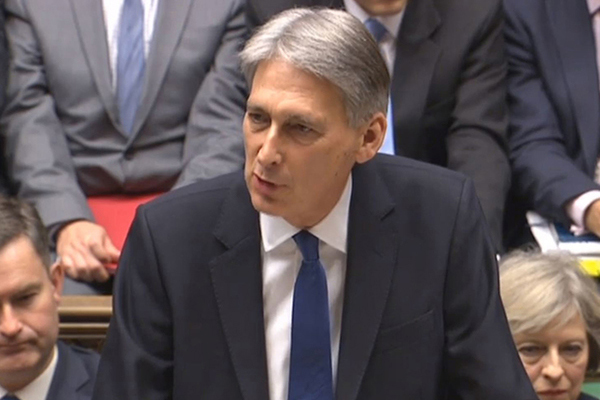You are viewing 1 of your 1 free articles
 Jules Birch
Jules BirchBudget small print reveals significant announcements for housing
Housing policies contained in the Autumn Budget and background documents published yesterday will have a large impact, if they actually go ahead, writes Jules Birch
If you listened to the chancellor’s speech you may have thought this was a budget that did not mean much for housing.
As ever, you may think again after reading the small print.
As I live blogged for Inside Housing yesterday, the big news in the speech was the extra money for Universal Credit that makes up for many of the cuts imposed in Universal Credit and delays the rollout yet again and sounds like it will be enough to avoid a backbench Conservative rebellion.
Elsewhere, Philip Hammond found £2.8bn to bring forward cuts in income tax allowances by a year but he failed to find roughly half that to scrap the final year of the freeze in most working age benefits including the Local Housing Allowance.
“The most interesting developments for housing came in the background documents published as Mr Hammond sat down.”
This was a clear political choice to go for tax cuts that overwhelmingly benefit the better-off over benefits that go to the poorest households.
Ahead of the next spending review, numbers crunched by the Resolution Foundation overnight suggest that the squeeze on everything, apart from health, will continue well into the 2020s.
However, the most interesting developments for housing came in the background documents published as Mr Hammond sat down.
These include several significant announcements that were either not mentioned at all or only hinted at his speech:
- A two-year extension to the Help to Buy equity loan scheme beyond the current end date of April 2021 – but only for first-time buyers and only for homes of up to 1.5 times average regional prices. This is laid out in the budget red book.
- A call for proposals for private shared ownership and affordable homeownership.
- Final recommendations from the Letwin Review to speed up build-out rates with new planning rules requiring greater diversity of tenure and types of home plus new powers for local authorities to drive development.
- Consultation on planning reform to support more new homes on the high street (this much was trailed in advance but it includes what could be a major expansion of permitted development rights).
Some of these are only consultations, some only recommendations that the government has not yet accepted, but if they do pan out they amount to a shake-up of housing supply with far-reaching implications for house builders, housing associations, for-profit providers and the commercial property sector.
As for local authorities and council housing, the chancellor hailed the lifting of the borrowing cap and (finally) confirmed that this will apply to Wales as well as England.
However, the budget report published by the independent Office for Budget Responsibility poured cold water on expectations of a new council housing boom by forecasting that the policy will generate a net increase of just 9,000 new homes by 2023/24.
It says: “We expect the removal of the cap to increase aggregate housebuilding by an additional 9,000 over the forecast period, as an increase in public sector housebuilding of just over 20,000 is partly offset by lower private sector housebuilding (including by housing associations).”
This is based on a questionable assumption that extra will crowd out some private sector housebuilding and it is way lower than every other forecast.
“The independent Office for Budget Responsibility poured cold water on expectations of a new council housing boom.”
And it also seems at odds with the Treasury’s estimates of the cost of the policy (£95m this year, rising to £1.2bn by 2022/23 and a total of £4.6bn over the next five and a half years) let alone the Local Government Association’s claim that it could generate £320bn for the economy over the next 50 years.
It remains to be seen how that circle will be squared – and whether any strings are lurking in a determination abolishing the hated cap published alongside the budget.
The restricted extension to Help to Buy was not unexpected but it is strange that Mr Hammond did not mention it in his speech.
It means the end of a scheme that has underpinned up to 40% of the sales, and even more of the profits and bonuses, of many of the major house builders – but not yet.
But it also avoids the hiatus that might have followed the shutters coming down completely in 2021 and gives house builders time to look elsewhere for opportunities.
One of those could well be the call for proposals on privately funded shared ownership and affordable homeownership
Some house builders have already formed for-profit providers with opportunities like this in mind but they will have to form an orderly queue with private equity and property investment firms.
Whether the consultation follows the flurry of recent launches or vice versa is not clear, but it’s not hard to detect the lobbying behind the scenes here and housing associations could face huge competition in a field they have until recently had to themselves.
The call for proposals is sketchy but nominates three categories: private shared ownership, private affordable homeownership and other routes to ownership from “the removal of regulatory or other barriers”.
It adds: “We are particularly interested in private shared ownership proposals where we believe government loan funding will play an important part in removing the risk and financial uncertainty created by staircasing.”
Proposals would have to match or exceed their current shared ownership lease and there would be requirements matching current ones on rent levels, the right to staircase and income levels.
However, for all the talk of ‘robust consumer protection’ there are problems with shared ownership as it stands and it’s far from clear how the entry of for-profit providers would improve things.
The Letwin recommendations – if accepted – promise an even more radical shake-up of the development of large sites (which means of more than 1,500 homes).
“There are problems with shared ownership as it stands and it’s far from clear how the entry of for-profit providers would improve things.”
The final report takes forward the key conclusion of the interim analysis that the key to faster build-out rates is to increase the diversity of the tenure and type of homes being built. However, it now proposes that this should be backed by new planning rules and incentives to make future government funding dependent on developers accepting new Section 106 agreements stipulating diversity.
There would also be “guidance for local authorities to press the diversity requirements to the point where they generate a maximum residual development value for the land on these sites of around ten times existing use value rather than the huge multiples of existing use value which currently apply”.
And, drawing on international experience, it envisages a much bigger role for local authorities, including powers to designate areas in local plans, compulsorily purchase land, draw up master plans and design codes and set up a local development company or bring in privately financed infrastructure company to lead the development.
Were those recommendations to be accepted by the government and come to fruition they would amount to a radical change in how housing is delivered on large sites.
However, there is already some scepticism from advocates of land value reform with Daniel Bentley of Civitas arguing that Sir Oliver Letwin has ducked the crucial question of repeal of the 1961 Land Compensation Act.
“The Letwin recommendations envisage a much bigger role for local authorities.”
And you also have to wonder why the final report was delayed to coincide with the budget only for the government to delay its response until February 2019, apart from making clear that existing large sites with outline planning permission will be exempted from any changes.
As if all this were not enough, the final consultation could change the face of England’s high streets.
It proposes extending permitted development rights to upward extensions of buildings in town centres, including blocks of flats, and a new right to allow for the demolition of existing commercial buildings to be redeveloped as residential.
Anyone looking at the empty shops in their local high street may see the attractions of this – but permitted development rights have already proved controversial amid evidence that some office to residential conversions have resulted in tiny and sub-standard flats.
These changes in the small print could be hugely significant if they go ahead as outlined above.
However, that is still a big if given that most are subject to consultation and could yet be watered down or abandoned. Watch this space.
Jules Birch, award-winning blogger
Autumn Budget 2018 - the key housing policies at-a-glance
- £1bn to help fund the implementation of Universal Credit over the next five years
- £500m in Housing Infrastructure Fund to unlock a further 650,000 homes
- The next wave of strategic partnerships with nine housing associations, which will deliver 13,000 homes
- British business bank guarantees for SME house builders
- ‘Simplification’ of process to convert commercial properties to new homes
- Providing funding to empower 500 neighbourhoods to allocate homes to local people in perpetuity
- Help to Buy equity loan scheme extended by two years to 2023 and limited to first-time buyers
- Retrospective inclusion of first-time buyers of shared ownership in stamp duty relief
Autumn Budget 2018 - full coverage
All our Autumn Budget 2018 coverage in one place:
The Autumn Budget lacked the ambition we need Philip Hammond’s Budget fell short for housing, writes Melanie Rees
There were no big fireworks but the Budget offers an opportunity to deliver The Budget leaves associations facing a choice and we must now deliver, argues David Montague
Names of new housing association strategic partnerships revealed Homes England has released the names of the eight housing associations that have just signed strategic partnerships with the government.
Budget a missed opportunity on housing, says NHF Reaction to the Autumn Budget from several organisations, including the National Housing Federation
Budget small print reveals significant announcements for housing Housing policies contained in the Autumn Budget and background documents published yesterday will have a large impact, if they actually go ahead, writes Jules Birch
Hammond’s extra Universal Credit cash is welcome – but we need homelessness specialists in Job Centres too The Autumn Budget must not become a missed opportunity to put in place measures to prevent homelessness, argues Ruth Jacob of Crisis
Hammond announces extra funding for Universal Credit: Philip Hammond has announced plans to pump more money into Universal Credit in the Autumn Budget today.
Help to Buy equity loan scheme extended to 2023 for first time buyers:The Help to Buy equity loan scheme will be extended two years to 2023 for first time buyers only, with new price caps set for each English region.
Housing Live - the Autumn Budget 2018 as it happened: Live-blogging from Jules Birch reveals how the Autumn Budget unfolded and what it means for housing
OBR: scrapping council borrowing cap will deliver only 9,000 new homes: Scrapping the borrowing cap will deliver only 9,000 new homes over the next five years, the Office for Budget Responsibility (OBR) has said.
Letwin: builders of large sites must accept more ’diversity’ of tenure: Builders should be required to accept suggested levels of affordable housing for large sites in order to receive government support, including Help to Buy, a major review of housebuilding has concluded.
Chancellor announces strategic partnerships with nine housing associations: Nine housing associations have signed new strategic partnerships with the government to deliver over 13,000 homes, Philip Hammond has announced.
Stamp duty scrapped for buyers of shared ownership homes worth up to £500,000: Stamp duty will be scrapped for first-time buyers of homes for shared ownership, the chancellor has announced.













